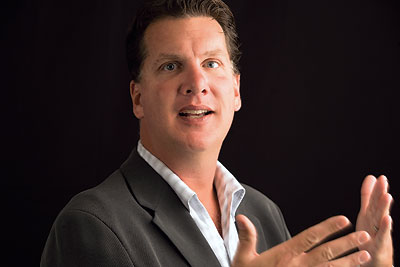Connections
Associate Professor of French Kirk Read joined the faculty in 1990, but his fondness for Bates dates to childhood.
As a a boy, he and his family vacationed at Ocean Park, founded in 1881 as a Freewill Baptist enclave and still a vibrant outpost of Bates alumni loyalty today. “I found it so wonderful to walk by and see the elderly women of the Ocean Park alumni group,” he says. “They seemed so fiercely proud of and loyal to Bates. They were the ones who gave Bates an entirely different feel from historically all-male schools.”

Educated at two of those schools, Dartmouth and Princeton, Read has, in the last five years, taught courses, served on the search committee that brought Elaine Hansen to Bates, served four terms as department chair, and been a key member of the faculty team that from 2004 to 2006 toiled to revise the General Education requirements.
But shortly after Commencement 2006, Read went into sabbatical mode. He de-personalized his Hathorn Hall office, carting out part of his library and a collection of New York City and Paris memorabilia so a visiting professor could move in. He shaved his Van Dyke and got on with his sabbatical, a year of academic exploration and rejuvenation.
His year will also include numerous appearances at events to thank donors to The Campaign for Bates. And after his first appearance, which was before Maine donors in Freeport, he and Bates Magazine editor Jay Burns spoke.
Burns: Besides Freeport, you’re heading to Boston, Hartford, Philadelphia, New York, D.C., the West Coast, and London and Paris. Why do you want to do this?
Read: Truthfully, in order to piece together a year-long sabbatical instead of the regular semester-long sabbatical, I volunteered willingly to speak at these events. But also truthfully, I enjoy it. It’s not about gushing to people about Bates; it’s another way of teaching and connecting. I really enjoy speaking to alums and parents about teaching at Bates. I admire Bates students and the alumni they become.
Burns: What will be your academic project this year?
Read: I’ll be exploring the concept of maternity in 16th- and 17th-century French literature, both women writers who used maternity as a recurring theme in their works, and male writers who appropriated maternal imagery. I’ve received faculty support grants — McGinty, Akers, Schmutz. That’s $4,450, and I’ll spend it on five weeks researching in Paris and London.
Burns: You’ve spoken at other Bates events. Is there anything predictable about what interests people about Bates academics?
Read: Alums make a point of telling me what they felt was valuable about their time at Bates. It might be required speech, or Cultural Heritage from the ’50s and ’60s, even a typing course.
Burns: Since those aspects of the curriculum don’t exist today, how do you respond?
Read: From their specific memories, I try to extrapolate as to what does exist today. How the Mount David Summit, for example, teaches students to present publicly their ideas and research. I believe that what they experienced and value will repermutate into what today’s generation must be competent in.
Burns: So here’s the $1,855 question: How has Cultch repermutated?
Read: The nicest thing someone said last night was, “These new General Education requirements are all Cultch. Cultch is all over what you are talking about.”
Burns: How do these new requirements compare to what Cultch gave students?
Read: Like Cultch, the General Education requirements focus on a Bates education outside the major. Students will take certain courses designated as “attentive” to the skills of writing, scientific reasoning, lab experience, and quantitative literacy. They will also take two concentrations — a quartet of courses and/or noncourse experiences — that share a clear organizing principle. So the focus still comes back to the idea of the newspaper test. An alum who opens the newspaper should be able to distinguish truth from hogwash, or truth from what Stephen Colbert calls “truthiness.” In the ’50s and ’60s, Cultch provided that ability. What we require today says to students, “You are going to have to deal with things from a lot of different angles. You must learn various entrees into problem solving.”
Burns: True, but Cultch focused on the basics of Western thought.
Read: I know a lot of people are concerned with whatever might be the Bates equivalent of the underwater basket-weaving course — the course that seems too focused on too small a topic, or devoid of intellectual underpinnings. When I speak, I try to head that concern off at the pass. Because we teach more about contemporary issues or recent immigrations or migrations in the world, that doesn’t mean that all of a sudden we don’t think about Moliere and Racine. Responsible teaching means you have to do both. You have more to do.
Burns: Can an entire curriculum or academic approach reflect the post-Sept. 11 world?
Read: During times of despair or tragedy or other epic events, the Bates faculty tends to ask poignant questions about their lives and mission. What is the relevance of what I do? How does this change anything? Am I doing enough?
The relevance does not elude me or my colleagues; that’s why we love our jobs. Disasters like 9/11 or Katrina allow a teacher to bring everything relevant from our various disciplines to bear on the current issues. So the experience focuses you. It cuts to the quick. You realize you must begin to have the discussions and arguments that you previously could not bear to have.
The standard line about academia is that the battles are fierce because the stakes are low. Quite the opposite is true, too. You can affect how people see the world and how they account for themselves in a way that other people can’t…or won’t.